Please fill out the following information, and RRFC Admissions will contact you to discuss our program offerings:
Issue #144
by L. Swift and Jeff McQ
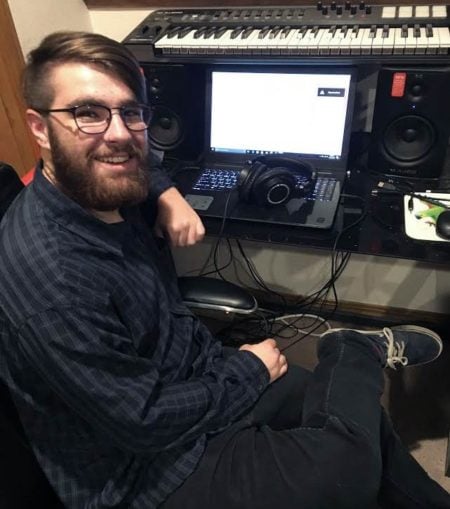 Talk about eager. Kyle Piarrot of Colorado Springs was so amped about the Recording Connection’s in-studio training that he first applied to the program when he was 15—two years before he graduated high school!
“I got approved for the program,” he says, “and I was ready to go, but my parents convened and decided that…I needed to focus on high school and make sure high school was in check before I did anything else.”
He couldn’t wait for long, though. He came back during his senior year, and was placed as an apprentice with Jarrod Headley at Clear Sound Studios in Colorado Springs. Kyle says he formed a bond with his mentor right away.
“He was extremely friendly, extremely outgoing,” says Kyle. “He made me feel really comfortable right off the bat. He took me up to the studio, and, you know, sat me down, and was like, “Hey, man, you know, this program’s really all about how much you put into it, and if you put a lot in, you’re going to get a lot back.”…I always felt like it was a learning environment. I didn’t feel scared to go in there ever. I was ready to learn when I went in there.”
Taking Jarrod’s advice to heart, Kyle determined to put as much into it as he could, even while juggling school and a part-time job. It was a crash-course in work ethic.
“It was interesting,” he says. “I was going into my senior year of high school. I was working part-time, 25 to 30 hours a week at Jamba Juice, and then during the nights I would go in with Jarrod. Initially, it started out once a week, and then once I got more proficient in things, we bumped it up to how often I wanted to be in there, you know, and how often we had business to attend to. So, it was a little hectic, but I got through it, and I learned a lot.”
Kyle pressed through the basic apprenticeship program, then stayed on with Jarrod to do the master’s program. And after the program, when Kyle decided he wanted to attend community college, Jarrod’s advice didn’t end with the apprenticeship.
“Jarrod helped me decide what my major was going to be in college,” says Kyle. “We were talking one night, and he was talking about, you know, there’s a real music side about the industry, and then the other side of the industry is really business. And if you’re proficient in business, it’ll make it a lot easier. So just as a way to help promote myself, promote any future brands I have or any future clients I have, I feel like a business degree is pretty applicable to anything.”
These days, Kyle’s work ethic continues to be a driving force for building his career. In between his business classes, not only does he continue to assist his mentor on projects in the studio, but he’s begun working with several local EDM producers and rappers including Fortune Flow Music and Vibe Tribe, as well as his own music project called Brick Brack, a duo with his friend Mo Al-Mubarak. And as if that wasn’t enough…
“I’m building my studio at the moment,” he says. “I’m going to get my interface here. Going to lease out an SM7B, just to have a really good vocal mic that I can have people come in and use. So, I really want to build my studio and then put my name out there as someone who can engineer and track for local artists….I’m really trying to reach out to the local artists and bring them in and really build something from the ground up.”
Kyle gives his mentor much of the credit for his success so far. “Jarrod definitely was a great mentor, and I think he’s what made my master’s program so successful,” he says, “because he cared about me, and he took his clients, his personal clients that were coming into the studio, and integrated my lessons with them, and that meant a lot. It helped me learn a lot.”
Why does Kyle work so hard toward his goals? “Understandably, it is a hard industry to break into,” he says. “But I think through hard work and dedication, really, as cheesy as that sounds, people break through.”
Check out a track from Kyle’s Brick Brack project, a collaboration with Mo Al-Mubarak, in our Students’ Work section down below!
Talk about eager. Kyle Piarrot of Colorado Springs was so amped about the Recording Connection’s in-studio training that he first applied to the program when he was 15—two years before he graduated high school!
“I got approved for the program,” he says, “and I was ready to go, but my parents convened and decided that…I needed to focus on high school and make sure high school was in check before I did anything else.”
He couldn’t wait for long, though. He came back during his senior year, and was placed as an apprentice with Jarrod Headley at Clear Sound Studios in Colorado Springs. Kyle says he formed a bond with his mentor right away.
“He was extremely friendly, extremely outgoing,” says Kyle. “He made me feel really comfortable right off the bat. He took me up to the studio, and, you know, sat me down, and was like, “Hey, man, you know, this program’s really all about how much you put into it, and if you put a lot in, you’re going to get a lot back.”…I always felt like it was a learning environment. I didn’t feel scared to go in there ever. I was ready to learn when I went in there.”
Taking Jarrod’s advice to heart, Kyle determined to put as much into it as he could, even while juggling school and a part-time job. It was a crash-course in work ethic.
“It was interesting,” he says. “I was going into my senior year of high school. I was working part-time, 25 to 30 hours a week at Jamba Juice, and then during the nights I would go in with Jarrod. Initially, it started out once a week, and then once I got more proficient in things, we bumped it up to how often I wanted to be in there, you know, and how often we had business to attend to. So, it was a little hectic, but I got through it, and I learned a lot.”
Kyle pressed through the basic apprenticeship program, then stayed on with Jarrod to do the master’s program. And after the program, when Kyle decided he wanted to attend community college, Jarrod’s advice didn’t end with the apprenticeship.
“Jarrod helped me decide what my major was going to be in college,” says Kyle. “We were talking one night, and he was talking about, you know, there’s a real music side about the industry, and then the other side of the industry is really business. And if you’re proficient in business, it’ll make it a lot easier. So just as a way to help promote myself, promote any future brands I have or any future clients I have, I feel like a business degree is pretty applicable to anything.”
These days, Kyle’s work ethic continues to be a driving force for building his career. In between his business classes, not only does he continue to assist his mentor on projects in the studio, but he’s begun working with several local EDM producers and rappers including Fortune Flow Music and Vibe Tribe, as well as his own music project called Brick Brack, a duo with his friend Mo Al-Mubarak. And as if that wasn’t enough…
“I’m building my studio at the moment,” he says. “I’m going to get my interface here. Going to lease out an SM7B, just to have a really good vocal mic that I can have people come in and use. So, I really want to build my studio and then put my name out there as someone who can engineer and track for local artists….I’m really trying to reach out to the local artists and bring them in and really build something from the ground up.”
Kyle gives his mentor much of the credit for his success so far. “Jarrod definitely was a great mentor, and I think he’s what made my master’s program so successful,” he says, “because he cared about me, and he took his clients, his personal clients that were coming into the studio, and integrated my lessons with them, and that meant a lot. It helped me learn a lot.”
Why does Kyle work so hard toward his goals? “Understandably, it is a hard industry to break into,” he says. “But I think through hard work and dedication, really, as cheesy as that sounds, people break through.”
Check out a track from Kyle’s Brick Brack project, a collaboration with Mo Al-Mubarak, in our Students’ Work section down below!
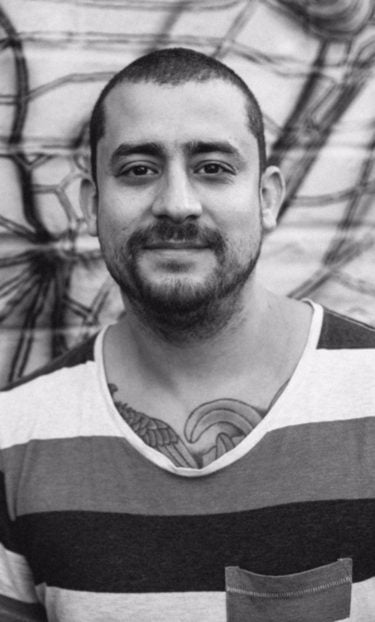 RRFC: What was it that first got you interested in music and recording?
Josh Monroy: My father played guitar. I would see him playing, and he had his guitar room. He would have me come in and he’d play me a song or whatever. It was just like a wow factor like, “Wow, my dad is so cool. He’s got all these guitars.” That kind of thing. I think as I got older, my love for music just got bigger and bigger…As soon as I graduated high school, I went to study music.
RRFC: So after school, what was your early experience in the studio like?
Josh: Early on it was…cleaning toilets and vacuuming and dusting consoles and that kind of stuff, regular grunt work stuff, going on food runs, of course. And then that led to becoming an assistant. So I’d set up rooms and carried down microphones and set up for drum tracking sessions and all that kind of stuff. I had a little more responsibilities and, of course, the natural progression led to becoming an engineer. My first engineering gig… I guess my first engineering gig was actually Keith Sweat…Keith actually taught me a lot on how to record quickly. He was very demanding, very fast-paced. So he was a really good client to have as a learning process, too…During that time, I actually met Ludacris, too.
RRFC: How did you end up getting to work with Ludacris? What made them put you on as the assistant on that session?
Josh: It’s a crazy story actually…I lived very far away. I drove a Jeep and I couldn’t afford the gas money. On one hand, it was because I was broke that got me that gig. On another hand, it was always because I would stick around the studio…At my house with my brothers where I was living there wasn’t anything to do besides drink or play video games…A lot of times I’d find myself sleeping at the studio. There were showers. There was a kitchen. There was coffee. There was a snack room. I pretty much had everything I needed….one of those nights, I was up there. It was just me in the studio, you know, the late night manager, and Ludacris called, and I happened to be the one to answer the phone. I took the order for the session, basically. I called the studio manager. She couldn’t get anyone. It was very late. She was like, “Well, Josh, it looks like you’re going to do your first assisting gig for Ludacris.” And there you go. She found an engineer, luckily, and I went in and set up the room and all that kind of stuff. Then, as they say, the rest is history. That engineer ended up quitting…I knew the whole session, and I knew the files, and I knew Luda very well. So I took over. That led to him offering me a personal engineering recording position for the next eight years. That dictated almost a decade of my life right there. You really just never know. I think if there’s anything that kids can take away from that, it’s like you never know what saying yes to one client or one person, or just making yourself available…is going to lead you. You never know how that person’s going to affect your career. Treat everyone very well.
RRFC: So let’s talk a little bit about JoJo and the album and that whole journey. Can you talk to us a little bit about working with the artist or is there anything about the sessions you want to talk about?
Josh: Absolutely. I think with JoJo, she’s such a… She knows who she is and she knows what she wants… I try to plan for everything but plan for nothing at the same time. I do a little listening research prior to the sessions, kind of get familiar with the artist, and then I feel like at least know who they were. But then I think it’s important for my own process anyway, not to predetermine in my own mind who I think they are, if that makes sense…I let the session dictate and just be ready for anything, but just let the artist just tell me who they are. I think that’s how I get a lot of good takes…
If you listen to my three songs on the JoJo album, for instance, they’re all completely different songs. “Like This” is an 808 driven hip-hop urban record. “Clovers” is more of a new pop dance type record. Then “Mad Love” is a throwback, Motown-meets-contemporary production thing. They’re all very different. I think the reason I have three songs on there is because I got into JoJo’s head and by allowing myself, my process, to be open and free like that. She is awesome, and she is just so easy to work with and comes prepared as well. When she walks in the door she is like, specifically with “Mad Love” she was like, “You know what? I had this idea. People say mad love, like ‘I got mad love for you.’”…”Mad Love” was born right there. It was literally the first chord progression I played.
RRFC: What was it that first got you interested in music and recording?
Josh Monroy: My father played guitar. I would see him playing, and he had his guitar room. He would have me come in and he’d play me a song or whatever. It was just like a wow factor like, “Wow, my dad is so cool. He’s got all these guitars.” That kind of thing. I think as I got older, my love for music just got bigger and bigger…As soon as I graduated high school, I went to study music.
RRFC: So after school, what was your early experience in the studio like?
Josh: Early on it was…cleaning toilets and vacuuming and dusting consoles and that kind of stuff, regular grunt work stuff, going on food runs, of course. And then that led to becoming an assistant. So I’d set up rooms and carried down microphones and set up for drum tracking sessions and all that kind of stuff. I had a little more responsibilities and, of course, the natural progression led to becoming an engineer. My first engineering gig… I guess my first engineering gig was actually Keith Sweat…Keith actually taught me a lot on how to record quickly. He was very demanding, very fast-paced. So he was a really good client to have as a learning process, too…During that time, I actually met Ludacris, too.
RRFC: How did you end up getting to work with Ludacris? What made them put you on as the assistant on that session?
Josh: It’s a crazy story actually…I lived very far away. I drove a Jeep and I couldn’t afford the gas money. On one hand, it was because I was broke that got me that gig. On another hand, it was always because I would stick around the studio…At my house with my brothers where I was living there wasn’t anything to do besides drink or play video games…A lot of times I’d find myself sleeping at the studio. There were showers. There was a kitchen. There was coffee. There was a snack room. I pretty much had everything I needed….one of those nights, I was up there. It was just me in the studio, you know, the late night manager, and Ludacris called, and I happened to be the one to answer the phone. I took the order for the session, basically. I called the studio manager. She couldn’t get anyone. It was very late. She was like, “Well, Josh, it looks like you’re going to do your first assisting gig for Ludacris.” And there you go. She found an engineer, luckily, and I went in and set up the room and all that kind of stuff. Then, as they say, the rest is history. That engineer ended up quitting…I knew the whole session, and I knew the files, and I knew Luda very well. So I took over. That led to him offering me a personal engineering recording position for the next eight years. That dictated almost a decade of my life right there. You really just never know. I think if there’s anything that kids can take away from that, it’s like you never know what saying yes to one client or one person, or just making yourself available…is going to lead you. You never know how that person’s going to affect your career. Treat everyone very well.
RRFC: So let’s talk a little bit about JoJo and the album and that whole journey. Can you talk to us a little bit about working with the artist or is there anything about the sessions you want to talk about?
Josh: Absolutely. I think with JoJo, she’s such a… She knows who she is and she knows what she wants… I try to plan for everything but plan for nothing at the same time. I do a little listening research prior to the sessions, kind of get familiar with the artist, and then I feel like at least know who they were. But then I think it’s important for my own process anyway, not to predetermine in my own mind who I think they are, if that makes sense…I let the session dictate and just be ready for anything, but just let the artist just tell me who they are. I think that’s how I get a lot of good takes…
If you listen to my three songs on the JoJo album, for instance, they’re all completely different songs. “Like This” is an 808 driven hip-hop urban record. “Clovers” is more of a new pop dance type record. Then “Mad Love” is a throwback, Motown-meets-contemporary production thing. They’re all very different. I think the reason I have three songs on there is because I got into JoJo’s head and by allowing myself, my process, to be open and free like that. She is awesome, and she is just so easy to work with and comes prepared as well. When she walks in the door she is like, specifically with “Mad Love” she was like, “You know what? I had this idea. People say mad love, like ‘I got mad love for you.’”…”Mad Love” was born right there. It was literally the first chord progression I played.
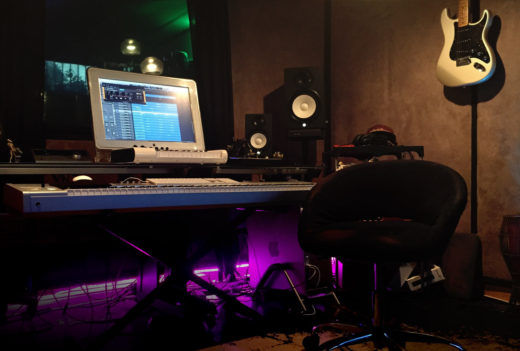
“iGLOo’s Suite” room in Studio 1 Zero
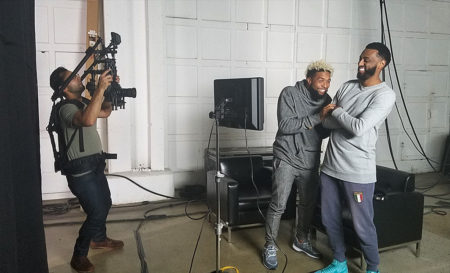 Film Connection student Anthony Zaccardi (New York, NY), who apprentices with Adam Lebenstein of ASL productions, recently had the opportunity to get up close and personal on-camera at the Draft Kings shoot at Parlay Studios with none other than Giants wide receiver Odell Beckham Jr.!
Film Connection student Anthony Zaccardi (New York, NY), who apprentices with Adam Lebenstein of ASL productions, recently had the opportunity to get up close and personal on-camera at the Draft Kings shoot at Parlay Studios with none other than Giants wide receiver Odell Beckham Jr.!
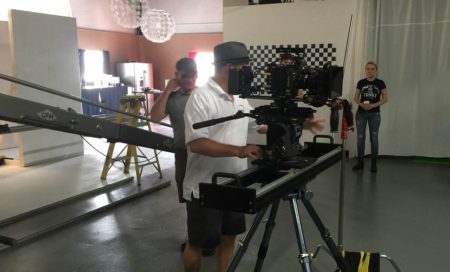 Just weeks into the program, Film Connection student Corey Jackson (Atlanta, GA) is having a great time learning filmmaking in a hands-on environment as he gleans insight from his mentor, Steve Carmichael, a 30-year veteran of film. “The first few lessons have been pretty interesting. I’ve discovered my mentor is a walking encyclopedia of all things film. It’s been really cool learning the history of how the pioneers of film got their start and how it applies to today’s technology. I’ve also been learning how to assemble cinema cameras for studio and crane use. It’s pretty amazing how versatile these systems are. I can’t wait for the next lesson!”
Just weeks into the program, Film Connection student Corey Jackson (Atlanta, GA) is having a great time learning filmmaking in a hands-on environment as he gleans insight from his mentor, Steve Carmichael, a 30-year veteran of film. “The first few lessons have been pretty interesting. I’ve discovered my mentor is a walking encyclopedia of all things film. It’s been really cool learning the history of how the pioneers of film got their start and how it applies to today’s technology. I’ve also been learning how to assemble cinema cameras for studio and crane use. It’s pretty amazing how versatile these systems are. I can’t wait for the next lesson!”

RRFC is education upgraded for the 21st century.
Get the latest career advice, insider production tips, and more!
Please fill out the following information, and RRFC Admissions will contact you to discuss our program offerings:
Stay in the Loop: Subscribe for RRFC news & updates!
© 2025 Recording Radio Film Connection & CASA Schools. All Rights Reserved.


